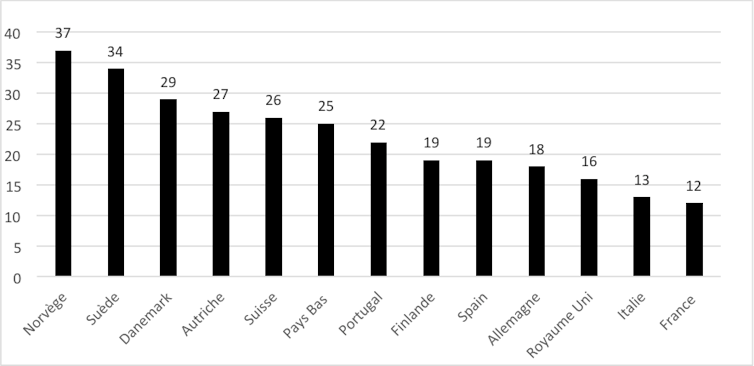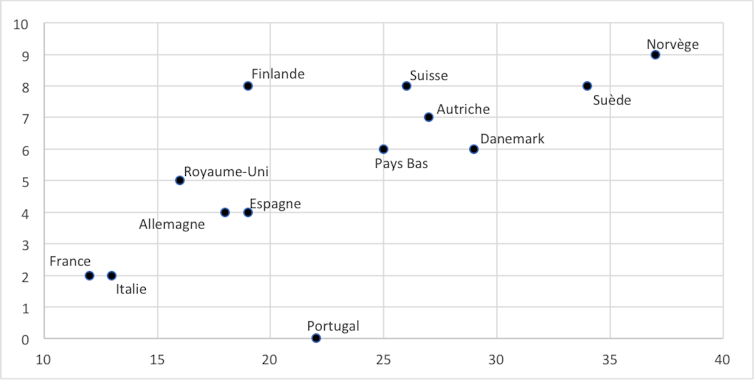Raul Magni-BertonProfessor of Political Science at Sciences Po Grenoble and at the Pacte laboratory
More and more French political groupings are defining themselves as "movements", rather than "parties". This is not unique; we've seen it recently in other countries, notably Spain and Italy. It's one of the symptoms of the negative meaning that the term "party" has gradually taken on.
Figure 1 below shows the percentage of respondents who say they trust political parties in the latest wave of the transnational European Values Survey research program conducted between 2017 and 2020.

Based on these data, we can make three observations.
First observation: confidence in political parties is very low overall. The country with the highest level of trust is Norway, where it stands at just 37%. By way of comparison, confidence in the police ranges from 67% in Spain to 95% in Finland. In other words, the population most distrustful of its police still trusts them almost twice as much as the population most trusting of political parties trusts them.
Secondly, Europe's five most populous countries are at the bottom of the pack. In fact, there are five countries in Western Europe with much larger populations than the others: Germany, France, Italy, the UK and Spain. These are the five countries with the lowest levels of trust in political parties.
Third finding: the French are the most distrustful. France is the country where this phenomenon is most pronounced, with only 12% confidence in political parties, a drop of 6 percentage points in ten years. This is probably the country that best explains what's going on throughout Western democracies.
Increasingly oligarchic political systems
Political systems in representative democracies are based on a simple principle: competition between political parties. In France, this principle is enshrined in Article 4 of the Constitution. It's a principle that allows our regimes to define themselves as "democratic", in the sense that citizens can influence policy by choosing the best option from a varied offering. If there were only one political party, as in China, the regime would no longer be democratic. Similarly, with a small number of parties cooperating rather than competing, we would have an oligarchic system. This is the case in countries like Cameroon, where elections are used to co-opt members of the few parties that run.
This competition works in exactly the same way as in economics. In theory, competition between companies favors consumers, competition between parties favors voters. When companies stop competing with each other, we run the risk of seeing the emergence of an oligopoly where a small number of suppliers set prices and sales policies together. Similarly, when parties stop competing with each other, we run the risk of an oligarchy, where the main parties together set the rules that benefit them.
But the optimism of the early competition theorists has long since been abandoned. Competition is not a stable equilibrium, and companies tend to cooperate. That's why we've seen the development of anti-trust laws that prohibit companies from "abusively exploiting a dominant position within the internal market or in a substantial part of it", to quote Article 102 of the Treaty on the Functioning of the European Union.
In politics, the rules governing competition between political parties are far less developed. Representatives of the major parties regularly rub shoulders in the corridors of Parliament, and are responsible, among other things, for establishing the rules governing party competition. Let's transpose this model to the economy: imagine that Microsoft and Apple had a majority on a board responsible for establishing the rules of competition between digital companies. They'd have no trouble colluding to produce rules that would benefit them to the detriment of other, smaller competitors.
Party-cartel
The party-cartel concept, developed by political scientists Richard S. Katz and Peter Mair, is based on this idea: our political systems produce cooperation between dominant parties that establish rules to protect themselves from potential competing parties, and activists who introduce competition of ideas within parties. This theory can be expressed in the terms of the European Union: several parties abusively exploit a dominant position in domestic politics or in a substantial part of it.
One of the main instruments of the cartelization of political systems in Europe is the public funding of political parties. Firstly, it makes parties independent of their activists. Whereas in the past, no party could do without volunteers, today this is no longer the case: the major parties have public funds at their disposal, enabling them to hire professionals rather than relying on the time and money of their activists. As a result, the welcome given to activists has become less warm, and the number of activists has fallen drastically in many democracies.
What's more, while activism could influence the choice of party leaders, since the practice of open primaries, activists no longer have a casting vote when it comes to choosing candidates and leaders, since their vote is worth no more than that of any other voter. As Figure 2 below shows, the level of activism is closely correlated with trust in political parties.

The way in which political life is financed also acts as a brake on the arrival of new parties. Loans are granted on the basis of past results, and repayments depend on the number of votes obtained. This encourages smaller parties to spend less. In France, for example, election reimbursements are ten times higher for candidates with 5% of the vote. Candidates who are more confident of success will therefore spend much more, reinforcing their advantage. This is how consolidated parties protect their position, while at the same time emptying themselves of activists. This has repercussions for society as a whole: the number of people who know an enthusiastic campaigner is reduced, as is the number of people to whom political parties turn for support. This lack of contact between citizens and parties generates mistrust. It also leads to a negative perception of the term "party", which some people try to cover up by using the word "movement".
This trend explains, on the one hand, the rise in abstention - as more and more citizens have very little influence on political life - and, on the other, the rise of "populist" parties that denounce a conflict between "elites" and "the people", such as the 5-Star Movement in Italy. Their success is not insignificant: anti-elite rhetoric works because it's based on the reality of the progressive independence of parties from the electorate.
A particularly strong trend in France
France's political party funding rules and the development of primaries are perfect illustrations of the cartelization theory. But beyond the question of financing, and in comparison with other countries, the tendency to reduce partisan competition is very strong in France.
Take, for example, the procedures for nominating candidates for the French presidency. France is the only European country with an elected president where there is no provision for "citizens' sponsorship" and where only local, national or European elected representatives have this right. Austria, Finland, Ireland, Iceland and Portugal, to name but a few in Western Europe, have this means of validating a candidate in their presidential elections, and see "no-label" presidents elected.
Restricting the candidates to elected representatives could result only in candidates from parties that already have elected representatives. However, the typically French presence of a large number of mayors from small communes means that other candidates are able to stand. In 2017, without these mayors, only 4 candidates would have stood for election. Yet the NOTRE law of 2015 has increased the dependence of communes on echelons better controlled by political parties, insofar as communes have virtually no means of raising taxes. The sponsorship law of 2016, meanwhile, made all sponsorships public. The combination of the two laws makes mayors of small communes more vulnerable to potential retaliation for unappreciated sponsorship, as their name is known and their commune is heavily dependent on the higher echelons. In 2017, three quarters of them did not sponsor, and this percentage is likely to increase.
Another example: during an election, each party or candidate has to finance the printing of its ballot papers. In Germany, there is a single ballot paper, financed by the state, on which all candidates or parties competing in the election appear. Voters mark their choice with a cross. French practice, apart from the financial and ecological costs, restricts party competition to those who can afford to pay for their ballots. There have been legislative proposals to move towards a German-style system, but these remain in the minority.
These examples illustrate how the restriction of partisan competition is built into our laws in the form of technical, low-profile decisions. In France, for the past twenty years, laws restricting electoral competition have led to a particularly critical situation, with which we are all familiar, characterized by a high abstention rate and strong protests.
Outside the traditional parties, deprived of activists and voters, new political movements are numerous, but those that manage to compete in elections are inescapably buoyed by considerable fortunes - such as those bearing Emmanuel Macron in 2017 or Éric Zemmour today - the only condition for overcoming the obstacles to partisan competition. In France, the cartel party has been particularly successful, and low confidence in parties is just one of the consequences.
This article is republished from The Conversation under Creative Commons license. Read theoriginal article.